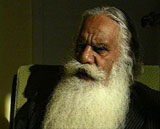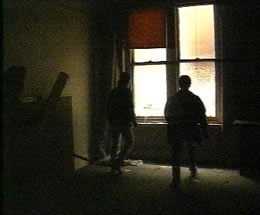The Great Australian Dreaming
 Burnum Burnum Burnum Burnum
"The Great Australian Dreaming" takes a layered, daring and ultimately provocative approach as it looks at the dual themes of housing injustice in this country, as well as opening the file again on the mythology of the great Australian dream of home ownership.
The film seeks to give the aboriginal voice its rightful place at the centre of such a vital national debate. It is a voice that articulates so eloquently the white values of greed, materialism and exploitation that underpin the "dream" and the injustice that goes with it. Burnum Burnum sets the framework for the debate when he says at the start of the film, "The white man says that his house is his castle; the aboriginal people say that the billabongs and the open space and the mountain range and the fresh air of the sea are his castle, and therein lies the difference in basic philosophy."
The film returns again and again to people's reflections about the dream - whether it is dead or alive, whether it's attainable or increasingly unattainable and whether it's worth striving for anyway. As in Parham's previous work, "BIG PEOPLE, SMALL PEOPLE" (which screened twice on SBS last year), this documentary canvasses a great diversity of views from left to right, rich to poor and everything in between. For example, the streetkid, speaking from her dingy, dirty squat in St.Kilda, says, "Mansions have too many empty rooms...when I walk through wealthy areas I get really upset and a lot of anger builds up. I feel disgusted and I want to smash them and destroy them... the Australian dream is lost!"
 Streetkids trash their squat Streetkids trash their squat
On the other hand, we hear another story from Don Mercer, no. 2 in the ANZ bank heirarchy and, many say, the one soon to replace the outgoing Chairman, Will Bailey. He says, "I don't think there is a problem... I don't see the provision of shelter as a driving social issue; we've got not a bad system here." And then there are the residents of Sanctuary Cove on the Gold Coast, a place that must be the ultimate icon of the dream attained. They could not agree more with Don Mercer. We hear one of them say, as he loads his rods onto his massive big game fishing-boat, "Oh, we hear a lot of gloom and doom, but I think people just need to get off their chuff and do some good honest, hard work - the dreams are affordable then." Well, who's right? Is there a problem or isn't there? Dr. Meredith Edwards, who heads the National Housing Strategy set up by Brian Howe, says, "We have very major problems now...If we do not get reform at this stage, we will have many people marginalised from our society." The Deputy Prime Minister, Brian Howe, goes on to say that, "… the most urgent and pressing question is the affordability of housing... We need to think about what are the forces that make housing so expensive for people."
So from here the debate hots up. The film does not pull any punches as it attacks the entrenched speculative mentality that drives the casino we call the property market. Even in this recession the pressures are building up ready to burst out again in the next cycle. Good times for the investor mean, of course, bad times for the first home buyer and those on lower incomes.
A central argument of the film is that the present tax regime directs all this unproductive investment into real estate, wrecking the economy and creating a kind of apartheid that pushes people out to the fringes of our sprawling cities.Ultimately though, the film is much more than a political discussion about the tax regime. More than demography is at work and more than the shape of our cities is at stake. As always, the fortunate will fight to protect their privileges at the expense of everyone else. As Don Mercer says ironically, "It would be a brave politician who took it on, I think."
But the film forces the question - What if we do nothing? Just look at the headlines that followed the recent L.A. riots - "California Screaming"... "The American Nightmare"... "The Fall of the New World"..."Is the U.S. Inner City Doomed?" We are always so wise after the event. The voice that warns, the prophetic voice, is always unwelcome, easy to dismiss, easy to crush."THE GREAT AUSTRALIAN DREAMING" opens with a quote from one of these voices from another time. Spoken so long ago by the prophet Isaiah into that ancient society, we should nevertheless be able to recognise in his words our own drama. "Surely the great houses will become desolate, the fine mansions left without occupants."
As the film opens, so does it close - with a prediction about the inevitable destruction that must come if the warnings about injustice are not heeded. Shot well before the L.A. riots, the chilling images of the closing sequence could not be more timely. Before the riots, they could have been easily dismissed as being a bit over the top. Now, they have taken on a new meaning... and a new importance. All the Western capitalist democracies of the world are touched by these events. We see them fumbling again for an appropriate critique, looking desperately for solutions.
All the hoary old social justice questions get a brief re-run until we are told that it's no use being nostalgic for the cosy prescriptions of the 60's which have not worked. Rather, we must move forward and find market-led solutions appropriate to the 90's. But are fundamental questions of social justice, of how we choose to organise ourselves as a society, ever out of date? Do we really want the country that now has more hired security guards than police to be our role model? Can we get it right as they go on getting it wrong?
|